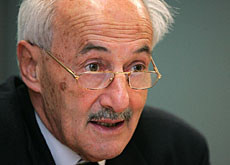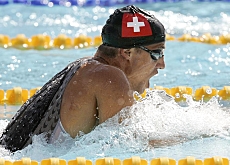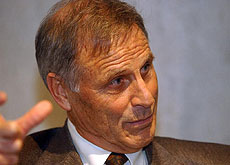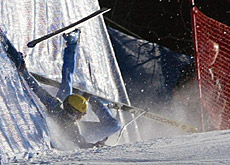Funding changes alone won’t save Swiss sport

As Swiss Olympic prepared to elect a new president, outgoing chief Walter Kägi told swissinfo that reforms are needed to make Swiss sport more competitive.
Kägi says there should be more federal funding, and a central decision-making body governing sport in the country.
On Friday Jörg Schild was elected as Kägi’s successor.
The outgoing president believes that by hosting major sporting events, Switzerland can increase interest in different sports and raise their profile.
Swiss Olympic recently warned that sport in Switzerland faced a bleak financial future. The country was failing to punch its weight at international level and the situation was unlikely to improve without more funding.
But with its own finances to all intents and purposes frozen, Swiss Olympic is threatening to cut funding to sports that do not perform as expected.
Norway, Austria and the Netherlands are among countries to have moved to a more streamlined structure for sports funding and are now reaping the reward, according to the association.
swissinfo: Is sport in Switzerland in a healthier state than when you became president of Swiss Olympic?
Walter Kägi: I think in the five years I have been president the situation has improved. We have made big steps forward concerning, for example, support for young athletes. We have also convinced most of the sports federations to follow the same doping guidelines. We have introduced ethical guidelines as well.
What we haven’t managed to do is to convince people that Switzerland can organise the Winter Olympics. Bern was a candidate for 2014, but voters turned it down. I’m still hoping, though, Switzerland can make a bid for the 2018 games.
We also have problems in some sports, such as skiing, where results aren’t what we would like to see.
swissinfo: Austria’s ski team, Switzerland’s old enemy, is considered a success, backed by the country’s school system. Should the Swiss go down that road?
W.K.: The Austrians have been very successful with their sports high schools. We have also begun building up some centres, creating Swiss Olympic Sport Schools and Swiss Olympic partner schools where the students concentrate more or less on their event. We want to open a ski academy in Brig. And we want to help create apprenticeships combining professional training with sports, too.
swissinfo: Is it dangerous to bet on a professional sports career in Switzerland?
W.K.: It’s a dangerous idea for youngsters if they are told to forget everything else. We need to prepare them for life after sport. You see too many athletes who have no options when their sporting careers are over. You have to realise there is not much respect either in Switzerland for professional sportspeople.
swissinfo: What needs to be changed in Swiss sport?
W.K.: There’s plenty to be done, but I think the most important thing we need is a central decision-making body that clearly defines everybody’s role.
swissinfo: Do you think more official support is needed for sport?
W.K.: We already rely mainly on the cantons and lotteries for our financing. But sponsors for sports are becoming more rare. So the cantons or the federal authorities will have to hand out more funding if sports are to thrive in Switzerland.
swissinfo: Does the public have to lend more support too?
W.K.: We usually have enough support. When our sportspeople are successful, everybody talks about it. When things don’t go so well, the Swiss lose interest. We are not a nation of sport fans like the Australians or Austrians. Austrians for example feel that skiing is in their blood.
But we think projects like our ethical guidelines and our campaigns, such as those against hooliganism and sexual abuse, can convince people that sport is taken seriously and convince parents that it’s a healthy activity for their kids. This will help build up support for sport, as will events such the 2008 European football championships in Switzerland and Austria.
swissinfo: Organising sports events requires volunteers. Are there enough people prepared to help in Switzerland?
W.K.: For major events, there is no problem finding people. It becomes more of a problem finding people to help run a club, because it is more difficult for potential volunteers to find the time that is needed. So far, we have been lucky but we need to be able to motivate the people who carry out unspectacular but necessary work.
swissinfo: Given the difficulties in finding these volunteers, should there be more centralisation?
W.K.: Switzerland’s highly federalist structure, which is reflected in its sports associations, is deeply ingrained in people’s mentalities. I think if a sports association functions well enough under these conditions, we shouldn’t mess with it. They will help develop tomorrow’s champions.
But we need to consider centralisation when we are talking about top-level sport. You can’t leave that to a regional association. It’s mostly a question of money. But we still want local associations to encourage and nurture the best talents.
swissinfo-interview: Scott Capper
Walter Kägi became president of the Swiss Olympic Association in 2001.
He joined the association’s executive committee in 1997.
From 1988 to 1996, he was president of the Swiss Rowing Federation.
A lawyer by profession, 70-year-old Kägi was also a government minister in canton St Gallen between 1992 and 2000.
81 sports federations are members of Swiss Olympic, representing around 3.2 million athletes.
Altogether, 27,000 clubs and associations are affiliated to Swiss Olympic.
The biggest federations are divided into cantonal and regional associations.

In compliance with the JTI standards
More: SWI swissinfo.ch certified by the Journalism Trust Initiative



You can find an overview of ongoing debates with our journalists here. Please join us!
If you want to start a conversation about a topic raised in this article or want to report factual errors, email us at english@swissinfo.ch.